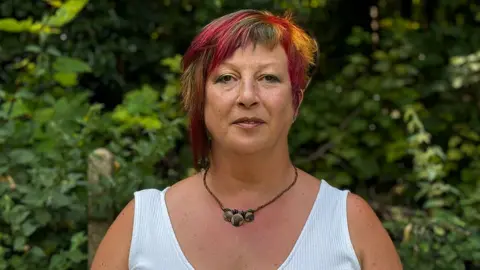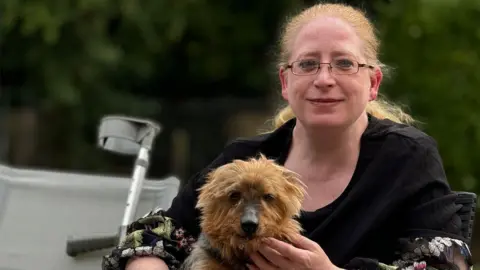 BBC
BBCThe public inquiry into the pandemic will start 10 weeks of hearings on Monday looking at the impact on patients, healthcare workers and the wider NHS.
Covid patients have been admitted to hospital more than a million times in the UK since the virus emerged in 2020, while countless others have had care for other conditions disrupted.
The third stage of the inquiry will also examine the impact on NHS staff, the use of masks and PPE in hospitals, the policy of shielding the most vulnerable and the treatment of long Covid.
And for the first time, the stories of more than 30,000 healthcare staff, patients and relatives will form part of the material entered into evidence.
BBC News has spoken to some of them.
“It was absolutely horrendous. We were really struggling, having to scrounge around for masks and gloves,“ says Mandi Masters, a community midwife from Aylesbury in Buckinghamshire.
At that early stage the NHS was, she says, “working in the dark” as the virus spread from China to Italy and then to the UK.
Later Mandi caught Covid herself – she is convinced at work – and ended up in hospital on oxygen for three weeks.
“My husband took me to A&E but had to leave me there, turn around and walk away,” she says.
“The news was coming out on how many health professionals were dying of Covid, but I was just too poorly to care at that point,” she says.
“Looking back, I have to admit, it was extremely frightening.”
Mandi, 62, has now returned to work part-time, but still struggles to catch her breath after a short walk.
Every cold or chest infection “wipes her out” and she “grieves for the person I was before Covid”.
Treatments and backlogs
The third section of the Covid public inquiry will look in detail at the effect on healthcare workers.
It will also cover:
- The diagnosis and treatment of patients with Covid and long-Covid
- Masks, PPE and infection control in hospitals
- The policy of shielding the most clinically vulnerable
- The use of GPs, ambulances and the NHS 111 helpline
- Maternity and end-of-life care
- NHS staffing including the use of private hospitals and temporary “Nightingale” sites
It has to examine the impact on the wider healthcare system, including the sharp increase in delays and waiting lists triggered by the pandemic.
Lynda Ross, from Portadown, was booked in for spinal surgery in early 2020.
Her operation was cancelled and, by the time she could see her specialist again, she was told it was too late for treatment.
“The consequence of that is I have to live my life in a level of pain that has me on the same medication as someone who is dying from cancer.” she says.
“It feels like the rest of my life has been destroyed.”

More than 50 witnesses are expected to give evidence over the next 10 weeks, including scientists, medical experts, healthcare workers and politicians.
Covid-19 Bereaved Families for Justice UK, which represents more than 7,000 relatives, says it is “deeply worried” that only two of the 23 witnesses it has put forward have been called to appear.
“Without our input, the inquiry risks repeating the mistakes that played out during the pandemic by failing to take into consideration the lived experience of ordinary families,” said its spokesperson Rivka Gottlieb.
The inquiry says it does allow members of the public to contribute online to its Every Story Matters project, and has run 20 different face-to-face events so far in town centres across the UK.
The stories of more than 30,000 healthcare workers, patients and relatives have been collated into a 200-page written record that will be entered into evidence on Monday.
The inquiry’s secretary, Ben Connah, said the document could not replace one-to-one testimony, but did allow a large number of people to contribute anonymously – “some of whom wouldn’t want to give formal evidence in a frankly scary courtroom”.
The public inquiry, likely to be one of the most expensive in legal history, has been split into nine different sections, each of which will hear from witnesses and report findings separately.
Baroness Hallett, who is chairing the inquiry, has already taken evidence on pandemic planning and political decision-making, with future sections expected on the vaccine rollout, the care sector, test and trace, the impact on children, and the economy.

